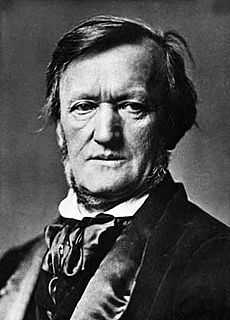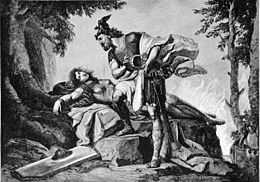Siegfried (opera)
| Richard Wagner |
|---|
 |
|
Operas
Uncompleted operas
|
Composition
Roles
| Role | Voice type | Premiere cast, 16 August 1876 (Conductor: Hans Richter) |
|---|---|---|
| Siegfried | tenor | Georg Unger |
| Mime | tenor | Max Schlosser |
| The Wanderer | bass-baritone | Franz Betz |
| Alberich | baritone | Karl Hill |
| Fafner | bass | Franz von Reichenberg |
| Waldvogel (the woodbird) | soprano (treble) [1] |
Marie Haupt |
| Erda | contralto | Luise Jaide |
| Brünnhilde | soprano | Amalie Materna |
Synopsis
Act 1

In a cave in the forest, the Nibelung dwarf Mime, Alberich's brother, is forging a sword. Mime is plotting to obtain the Ring for himself. He has raised the human boy Siegfried as a foster child, to kill the dragon, Fafner, who guards the Ring and other treasures. He needs a sword for Siegfried to use, but the youth has broken every sword Mime has made. Siegfried returns from his wanderings in the forest with a wild bear that he caught and demands his new sword, which he immediately breaks. After Siegfried's tantrum and a carefully studied speech by Mime about Siegfried's ingratitude toward him, Siegfried comes to understand why he keeps coming back to Mime although he despises him: he wants to know his parentage. Mime is forced to explain how he took in Siegfried's mother, Sieglinde, who then died, giving birth to Siegfried. He shows Siegfried the broken pieces of Nothung, which Mime had obtained from her. Siegfried orders him to reforge the sword; Mime, however, has been unable to accomplish this because the metal refuses to yield to his best techniques.

Siegfried departs, leaving Mime in despair. An old man (Wotan in disguise) arrives at the door and introduces himself as the Wanderer. In return for the hospitality due a guest, he wagers his head on answering any three questions or riddles from Mime. The dwarf agrees in order to get rid of his unwelcome guest. He asks the Wanderer to name the races that live beneath the ground, on the earth, and in the skies. These are the Nibelung, the Giants, and the Gods, as the Wanderer answers correctly. Mime tells the Wanderer to be on his way but is forced to wager his own head on three more riddles for breaking the law of hospitality. The Wanderer asks him to name the race most beloved of Wotan, but most harshly treated; the name of the sword that can destroy Fafner; and the person who can make the blade. Mime answers the first two questions: the Wälsungs and Nothung. However, he cannot answer the last. Wotan spares Mime, telling him that only "he who does not know fear" can reforge Nothung, and leaves Mime's head forfeit to that person.
Siegfried returns and is annoyed by Mime's lack of progress. Mime realizes that Siegfried is "the one who does not know fear" and that unless he can instill fear in him, Siegfried will kill him in accordance with the Wanderer's prediction. He tells Siegfried that fear is an essential craft; Siegfried is eager to learn it, and Mime promises to teach him by taking him to Fafner. Since Mime was unable to forge Nothung, Siegfried decides to do it himself. He succeeds by shredding the metal, melting it, and casting it anew. In the meantime, Mime brews a poisoned drink to offer Siegfried after the youth has defeated the dragon. After he finishes forging the sword, Siegfried demonstrates its strength by slicing the anvil in half with it.
Act 2

The Wanderer arrives at the entrance to Fafner's cave, outside of which Alberich has been keeping vigil. The old enemies quickly recognize each other. Alberich blusters, boasting of his plans for regaining the ring and ruling the World. Wotan calmly states that he does not intend to interfere, only to observe. He even offers to awaken Fafner so that Alberich can bargain with him. Alberich warns the dragon that a hero is coming to fight him, and offers to prevent the fight in return for the Ring. Fafner dismisses the threat, declines Alberich's offer, and returns to sleep. Wotan leaves and Alberich withdraws.
At daybreak, Siegfried and Mime arrive. Mime decides to draw back while Siegfried confronts the dragon. As Siegfried waits for the dragon to appear, he notices a woodbird in a tree. Befriending it, he attempts to mimic the bird's song using a reed pipe, but is unsuccessful. He then plays a tune on his horn, which brings Fafner out of his cave. After a short exchange, they fight; Siegfried stabs Fafner in the heart with Nothung.
In his last moments, Fafner learns Siegfried's name, and tells him to beware of treachery. When Siegfried draws his sword from the corpse, his hands are burned by the dragon's blood, and he instinctively puts them to his mouth. On tasting the blood, he finds that he can understand the woodbird's song. Following its instructions, he takes the Ring and the Tarnhelm from Fafner's hoard. Outside the cave, Alberich and Mime quarrel loudly over the treasure. Alberich hides as Siegfried comes out of the cave. Mime greets Siegfried; Siegfried complains that he has still not learned the meaning of fear. Mime offers him the poisoned drink. However, the lingering effect of the dragon's blood allows Siegfried to read Mime's treacherous thoughts, and he stabs him to death. Alberich, observing from offstage, laughs sadistically. Siegfried then throws Mime's body into the treasure cave and places Fafner's body in the cave entrance to block it as well.
The woodbird now sings of a woman sleeping on a rock surrounded by magic fire. Siegfried, wondering if he can learn fear from this woman, heads toward the mountain.
Act 3

The Wanderer appears on the path to Brünnhilde's rock and summons Erda, the earth goddess. Erda, appearing confused, is unable to offer any advice. Wotan informs her that he no longer fears the end of the gods; indeed, it is his desire. His heritage will be left to Siegfried the Wälsung, and their (Erda's and Wotan's) child, Brünnhilde, will "work the deed that redeems the World." Dismissed, Erda sinks back into the earth.
Siegfried arrives, and the Wanderer questions the youth. Siegfried, who does not recognize his grandfather, answers insolently and starts down the path toward Brünnhilde's rock. The Wanderer blocks his path, but Siegfried breaks Wotan's spear with a blow from Nothung. Wotan calmly gathers up the pieces and vanishes.
Siegfried enters the ring of fire, emerging on Brünnhilde's rock. At first, he thinks the armored figure is a man. However, when he removes the armor, he finds a woman beneath. At the sight of the first woman he has ever seen, Siegfried at last experiences fear. In desperation, he kisses Brünnhilde, waking her from her magic sleep. Hesitant at first, Brünnhilde is won over by Siegfried's love, and renounces the world of the gods. Together, they hail "light-bringing love, and laughing death."
Noted excerpts
As with the rest of the Ring, a few excerpts are heard outside the opera house. The most commonly heard excerpt from Siegfried is the Forest Murmurs.
Other famous excerpts include
- Prelude to Act I
- Siegfried's Forging Song (Nothung! Nothung! Neidliches Schwert!) (Act I)
- Forest Murmurs (Act II)
- Prelude to Act III
- Siegfried passing through the magic fire
- Brünnhilde's Awakening (Heil dir, Sonne!) (Act III)
- Quotations of the Siegfried Idyll (Act III)
Recordings
Sources
Siegfried begins fearless, and expresses his wish to learn fear to his foster father Mime, who says the wise learn fear quickly, but the stupid find it more difficult. In a letter to his friend Theodor Uhlig, Wagner recounts The Story of the Youth Who Went Forth to Learn What Fear Was, about a boy so stupid he could not discover what fear was—and points out that the youth and Siegfried are the same character. Although Wagner did not include the connection, the boy is taught fear by his wife, as Siegfried learns it when he discovers the sleeping Brünnhilde.[2]
See also
References
- ↑ German Wikipedia states that this role is a Knabensopran.
- ↑ Tatar, Maria. The Hard Facts of the Grimms' Fairy Tales, p. 104, ISBN 0-691-06722-8.
- Notes
External links
| Wikimedia Commons has media related to Siegfried. |
- Richard Wagner - Siegfried. A gallery of historic postcards with motifs from Richard Wagner's operas.
- Vocal score of Siegfried
- The libretto in German
- Washington National Opera's new interpretation of Siegfried
| |||||||||||||||||||||||||||||
| |||||||||||||||||||||||||